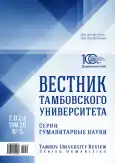Implementation of Internet and digital technologies in school education in the Republic of Ghana
- Authors: Danilova L.N.1
-
Affiliations:
- Yaroslavl State Pedagogical University named after K.D. Ushinsky
- Issue: Vol 29, No 5 (2024)
- Pages: 1405-1418
- Section: PEDAGOGY OF SECONDARY AND PRESCHOOL EDUCATION
- URL: https://bakhtiniada.ru/1810-0201/article/view/297673
- DOI: https://doi.org/10.20310/1810-0201-2024-29-5-1405-1418
- ID: 297673
Cite item
Full Text
Abstract
Importance. The power of the Internet enables universal literacy, access to education for girls and children with disabilities, etc. The study aims to analyse the implementation of Internet and digital technologies into Ghana’s schools, which reveals the problems of this area, national specifics of integration, and ambitious projects of the government.Materials and Methods. Based on comparative, sociological, statistical, and factor analysis, the educational documentation of Ghana, some international organisations, Ghanaian research, sociological surveys, reports from official departments, and feedback from students, teachers, and the media on the issue of digital technologies in schools have been studied.Results and Discussion. National statistics on access to the Internet and the use of digital technologies by citizens in everyday life and on access and digital skills of Ghanaian teachers are analysed. The factors determining implementation of the Internet and technologies in Ghana’s society have been identified. The problems hindering digital integration in the school education system of Ghana have been identified. The legal framework for the digitalisation of Ghanaian education has been defined. The most significant projects of general education digitalisation are characterised and analysed.Conclusion. Ghana has developed their information and communications technology policy that includes education digitalisation, which directions are appropriate infrastructure, educational environment, professional development of teachers, and development of schoolchildren's digital skills. They are supported legislatively, financially, and methodically; the authorities and public organisations implement different significant projects related to digital and technology Internet access. However, most of them are aimed only at certain small student groups, keeping many schoolchildren outside the technological modernization. Organisational difficulties that create such a contradiction include material and financial deficits of education and subjective rejection.
About the authors
L. N. Danilova
Yaroslavl State Pedagogical University named after K.D. Ushinsky
Author for correspondence.
Email: yar-da.l@mail.ru
ORCID iD: 0000-0002-1272-401X
Dr. Sci. (Education), Associate Professor, Professor of Theory and History of Pedagogy Department
108/1, Respublikanskaya St., Yaroslavl, 150000, Russian FederationReferences
- Prikhodko D.V., Sherov-Ignatiev V.G. (2024). Digital economy in Africa: condition and problems of develop-ment. Vestnik Sankt-Peterburgskogo universiteta. Ekonomika = St Petersburg University Journal of Economic Studies, no. 40 (1), pp. 3-35. (In Russ.) https://doi.org/10.21638/spbu05.2024.101, https://elibrary.ru/ybwqty
- Wolf S., Aurino E., Suntheimer N., Avornyo E., Tsinigo E., Edward J., Jordan J., Samanhyia S., Aber J.L., Behrman J.R. (2021). Learning in the Time of a Pandemic and Implications for Returning to School: Effects of COVID-19 in Ghana. London, CPRE Working Papers, 44 p.
- Sabates R., Carter E., Stern J. (2021). Using educational transitions to estimate learning loss due to COVID-19 school closures: The case of Complementary Basic Education in Ghana. International Journal of Educational Development, vol. 82. https://doi.org/10.1016/j.ijedudev.2021.102377
- Upoalkpajor J.-L.N., Upoalkpajor C.B. (2020). The Impact of COVID-19 on Education in Ghana. Asian Journal of Education and Social Studies, no. 9, vol. 1, pр. 23-33. https://doi.org/10.9734/ajess/2020/v9i130238
- Baiden B., Jackson A. (2023). Influence of Internet Usage on Academic Performance of College of Education Students: Rhetoric or Reality? International Journal of Computer, vol. 49, pp. 1-15.
- Baako I., Gidisu P., Umar S. (2023). Access to Electricity in Ghanaian Basic Schools and ICT in Education Pol-icy Rhetoric: Empirical Quantitative Analysis and Access Theory Approach. International Journal of Education and Management Engineering, no. 5, vol. 13, pp. 23-33. https://doi.org/10.5815/ijeme.2023.05.02, https://elibrary.ru/eefsef
- Donkoh R., Lee W.O., Ahoto A.T., Donkor J., Twerefoo P.O., Akotey M.K., Ntim S.Ye. (2023). Effects of educational management on quality education in rural and urban primary schools in Ghana. Heliyon, no. 9, vol. 11, pр. 1-14. https://doi.org/10.1016/j.heliyon.2023.e21325, https://elibrary.ru/tymotk
- Tsapali M., Louis M., Kalifa D., Joel M., Abeba T. (2021). Country-Level Research Review. EdTech in Ghana, pp. 1-92.
- Abaidoo N., Atidaa Akurigo M. (2021). The Use of the Mobile Phone Technology as an Instructional Tool for Lesson Delivery at Abura Asebu Kwamankese District. Journal of Education and Practice, no. 12, vol. 9, pр. 138-148.
- Sarpong G., Osei M., Bonsu T. (2023). Evaluating Digital Technology Access and Usage among Teachers. Manageria, no. 8, vol. 1, pp. 21-38. https://doi.org/10.14421/manageria.2023.81-02, https://elibrary.ru/sncpij
- Narth-Kent M., Osei M., Oteng B. (2022). Readiness of Education 4.0 in Ghana. Open Journal of Social Sciences, no. 10, vol. 1, pp. 502-517. https://doi.org/10.4236/jss.2022.101037
Supplementary files








